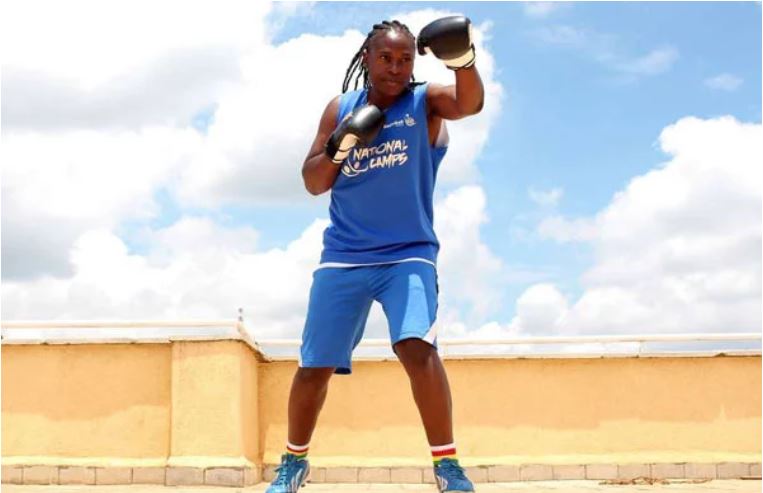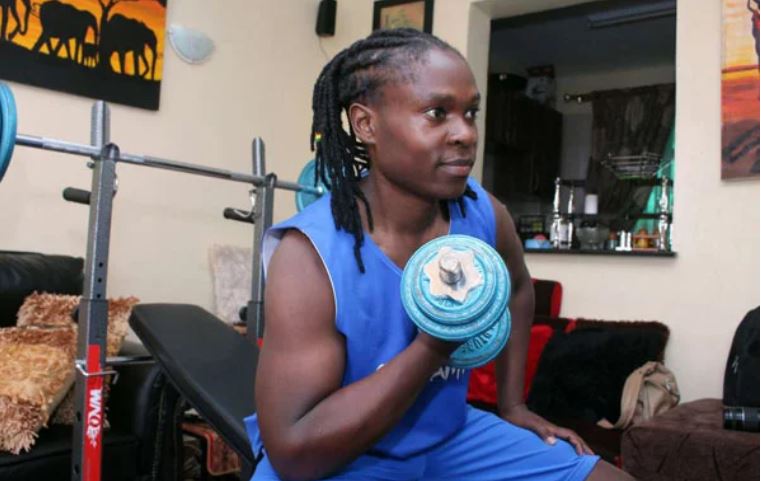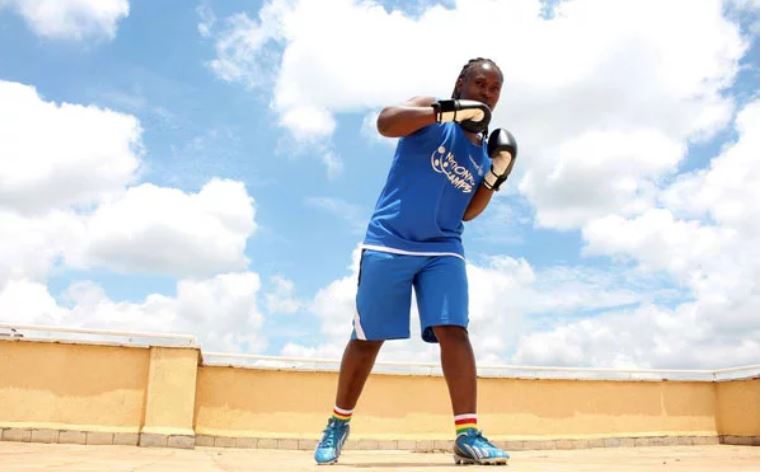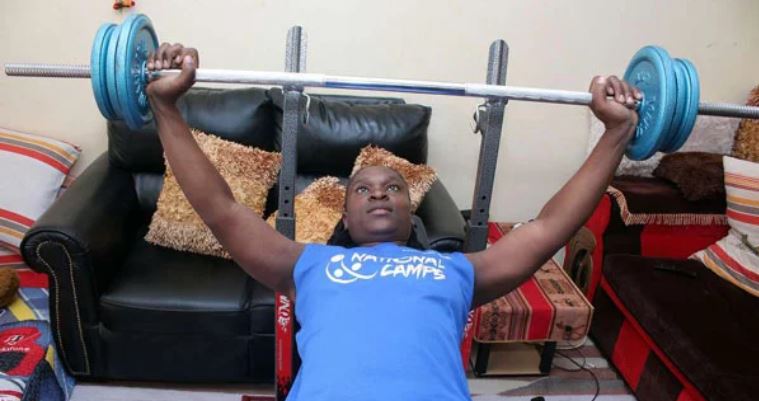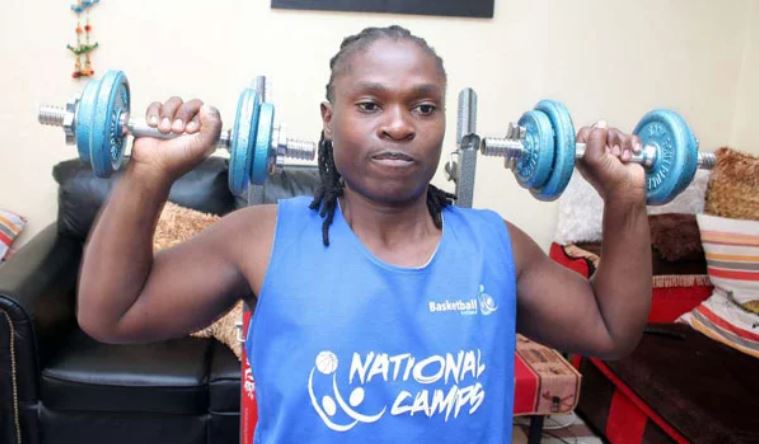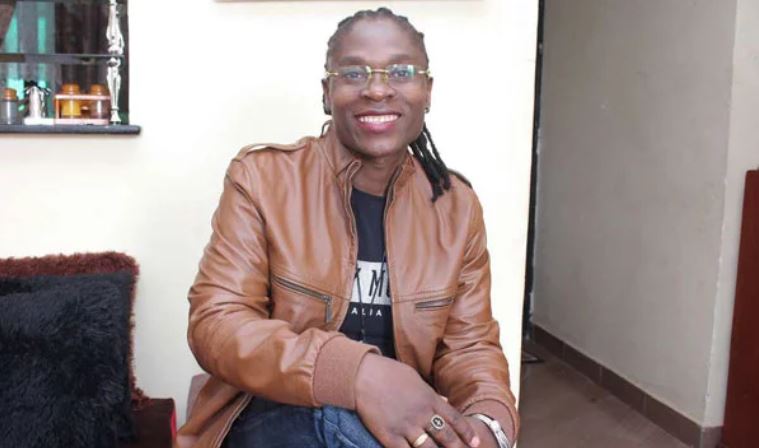
Nadala is still strong to date, and due to the intense workouts that her job demands, she is often mistaken for a man, a factor that she takes it in her stride.
She holds an impressive resume that includes a black belt in kickboxing, a professional in competitive boxing, is trained and certified in handling small firearms and has training in defensive driving.
When she is not doing all this, Nadala teaches personal defence skills, mostly to women.
She has worked as a bodyguard to ambassadors and to several prominent individuals in Kenya, a job that has taken her to various countries around the world.
Nadala spoke myNetwork about her journey in becoming a badass.
When did you start boxing?
It has been many years now. I loved sports from a young age, specifically football and competitive marathons. I also greatly admired Conjestina Achieng (the pioneering Kenyan female boxer) and my wish was to one day meet her.
I also dreamed of excelling in martial arts, but never imagined that one day this dream would become a reality.
I dropped out of school in Form Two because my parents could no longer afford to pay my school fees. I thought long and hard about my future.
I reasoned that Nairobi might have more opportunities for me than my village back in Kakamega had to offer. Once I arrived in Nairobi however, it soon became clear that Nairobi iko na wenyewe, (Nairobi is not for the faint-hearted).
I was 15 then, and life quickly became a nightmare. I ended up in the streets. It was tough, but I was a tough girl with a steely determination which prevented me from going back to the village empty-handed.
I did stuff that street children do, such as smoking bhang, but I courageously fought off men who tried to abuse me.
How did you eventually get here?
One day, after about three years of living in the streets, I heard about the Kangemi Boxing Club, which offers free lessons. I looked for the club and joined. I trained in boxing and bodybuilding and gave it my all.
The results were visible. I was well toned, had rippling muscles and was swift on my feet. Soon, I was being hired by people who needed to settle scores with their adversaries, such as credit defaulters.
I finally had money to get me off the streets but I was unhappy doing what I was doing.
I wanted to do something respectable, and so I started looking for another job.
After about six months, I heard about a job opening for a bouncer in a night club in Westlands. I applied and was offered the job. I had to quickly learn that a bouncer is a bouncer, no one cares whether you are a man or a woman.
I continued to train even after I got the job. I trained during the day and worked at night. After two years, I got another bouncer’s job, but this time at a Casino in Nairobi’s CBD.
What other training have you had?
While working as a personal bodyguard to an ambassador, I went through several trainings, including small firearms handling and defensive driving. Boxing is a sport, so training never ends. I train every day and run every morning.
With such skills, are you ever scared?
“Of course! I am brave, but I am not stupid. When I worked at a casino, an unruly patron a colleague and I were escorting out of the premises suddenly pulled out a gun. I quickly let go of him and lay down. I was calm but very scared.
Fortunately, my colleague was trained on how to handle a gun-wielding adversary. He intervened and we were able to tackle the man to the ground.
Which is your most memorable assignment so far?
That would be the one I did in Saudi Arabia. I was hired to guard the wife of a public figure.
Due to the strict dressing code for women there, I realised that being covered up in the hijab would greatly hamper my work. After discussions with my employer, I was allowed to dress up as a man, in my professional security attire – a black suit.
Thanks to my physique, everyone thought that I was a man. The downside was that I had to use men’s washrooms to match the profile I was fronting, which really got me nervous. Thankfully, there are cubicles in urinals.
What career options are there for someone trained in martial arts?
There is VIP protection, which entails being a personal bodyguard. I do this a lot.
Other careers in the security sector include working as a security escort for children or wives of prominent persons. One can also be a martial arts trainer, a job I do in one of the gyms in Nairobi.
Are there jobs that you turn down?
Yes, I don’t do dirty jobs, for example being paid to beat up people or engage in unprofessional fights.
What qualities does one need to make a good bodyguard?
One needs discipline, courage, confidence, and the ability to think on your feet, as well as a deep desire to protect and defend. A bodyguard must be fit, so physical training throughout is a must.
What, on average, do you earn from your bodyguard’s job?
The income is good, especially for VIP protection. It is at least above Sh100,000 per month. Professional boxing tournaments also pay very well.
Where can a young person who wants to get into this field get the necessary training?
Personal initiative is key – look and ask around and see what’s on offer. You of course need to join boxing clubs or martial arts clubs for training.
What is a typical day like for you?
I wake up at 5am and do a 10km run. Thereafter, I train at the gym, and then I train a group of women in self-defence.
Afterwards, I attend to my business – I own a tour and travel company. I have also built a holiday home in Kitale that I occasionally hire out to local and international tourists.
Once in a while, when I’m not keen on seating behind my desk doing paper work, I enjoy driving my clients around the various tourist destinations that our country has to offer.
What motivates you?
My driving force has always been to ward off poverty. We were so poor back home that even one meal a day was not always assured. Just to understand how poor we were, I wore my first pair of shoes when I turned 14 years when joining high school.
What advice would you give a young person reading your story?
I would like to tell young women that they can make it without ‘sponsors’ (sugar daddies). Everyone is born with a talent. Find yours and pursue it. Don’t just sit there waiting for a miracle, go make your own miracle, pursue your dream. There are no short cuts.
I came from a poor background, but today, my parents live in a beautiful home that I built for them. I also have a thriving career and business. If I could do it, with only a Form Two education, why can’t you?
